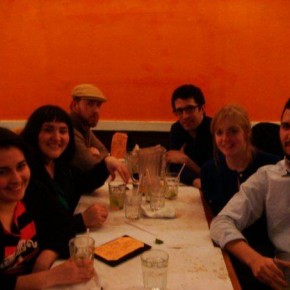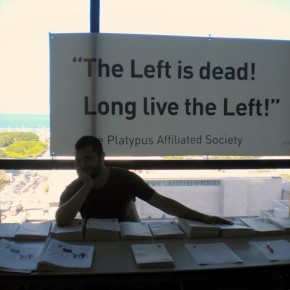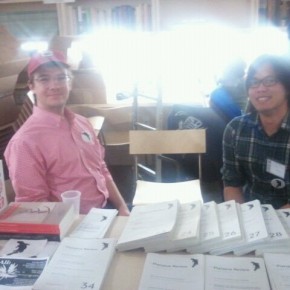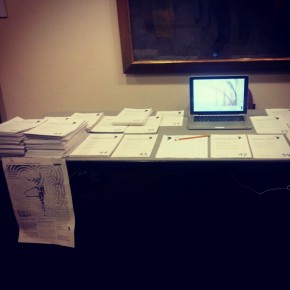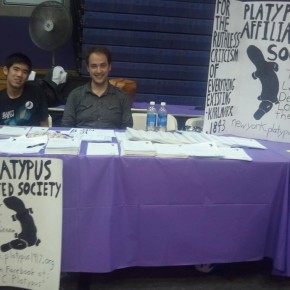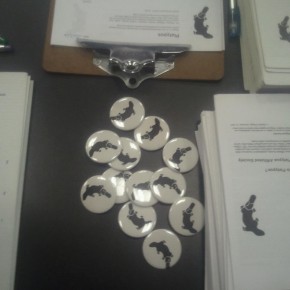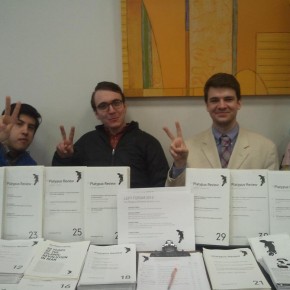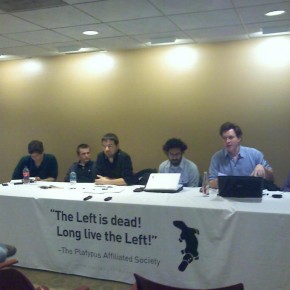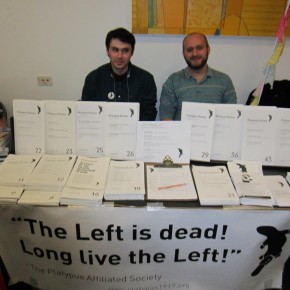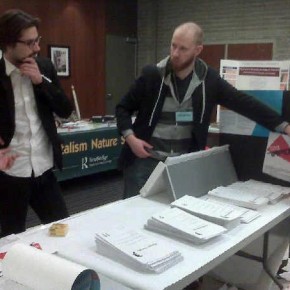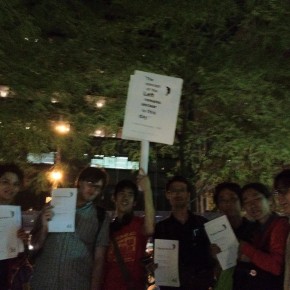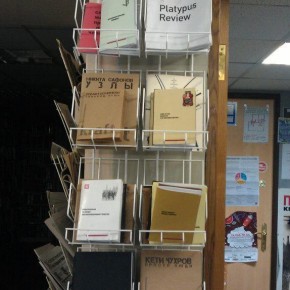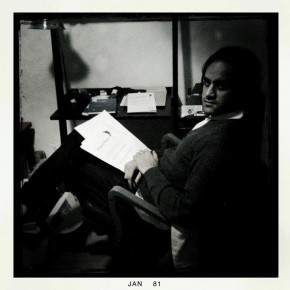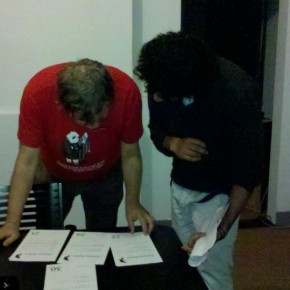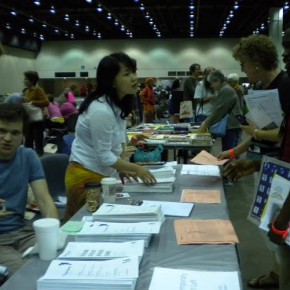Sammy Medina, Pam C. Nogales C., and Ross Wolfe gave teach-ins as part of the Free University during the Day of Action against Cooper Union’s unprecedented tuition requirements. Pam did a teach-in on 19th-century American history and struggles for emancipation, while Sammy and Ross talked about the sociohistoric project of early modernist architecture.
The Left after the Election
PANELISTS:
• BEN CAMPBELL (The North Star)
• ANNIE DAY (Revolution)
• ANTHONY GALLUZZO (CUNY)
• CHRIS MAISANO (DSA, Jacobin)
• BHASKAR SUNKARA (Jacobin)
Thursday
Dec 6, 2012
7:00-10:00pm
MODERATOR:
• TANA FORRESTER (Platypus Affiliated Society)
Thursday
Dec 6, 2012
7:00-10:00pm
NYU Kimmel Center
60 Washington Square South, rm 804
New York, NY 10011
Join the Facebook event page.
This past US election season saw an array of positions on the Left concerning the outcome that might follow from either major party's victory. Among them, there were some who openly supported the incumbent Barack Obama as the lesser of two evils, others who opposed him by casting a vote for another candidate, and still others who followed the abstentionist line by not voting at all. Many of those who voted for "four more years" did so under the assumption that the Democrats were a broadly center-left party with vaguely social-democratic tendencies, who might be pushed to reverse neoliberal policies and stave off measures of austerity. Some, while generally less optimistic, endorsed Obama on the premise that organizing a mass movement against capitalism would be easier with the Democrats in power. Others argued that Obama had done nothing to deserve reelection, offering no hope for either change or progress moving forward. The rest, who took no stance either for or against any party, chose instead to eschew electoral politics altogether.
Now that the quadrennial plebiscite for the "leader of the free world" has resulted in a Democratic victory, we are afforded a brief chance to critically evaluate the prospects for the Left's transition into the next four years. What is different today from four years ago, when Obama's election seemed departure from eight years under Bush? Did the last four years signal progress or regress for the Left? How will the terrain shift for the Left with another term under the president? In terms of foreign policy, will there be an end to the wars? Or will US militarism continue unabated? Domestically, will government social programs and infrastructure deteriorate yet further? Or will legislative reforms breathe life back into the moribund welfare state? Should we, in fact, take for granted the idea that keeping Romney out of office promises a better environment in which the Left to organize? What does the future hold for a Left caught in the stale air of the status quo?
•
A panel event held at the New School in New York City on November 14th, 2012.
LOREN GOLDNER ┇ DAVID HARVEY ┇ ANDREW KLIMAN ┇ PAUL MATTICK
Transcribed in Platypus Review #56:
The present moment is arguably one of unprecedented confusion on the Left. The emergence of many new theoretical perspectives on Marxism, anarchism, and the left generally seem rather than signs of a newfound vitality, the intellectual reflux of its final disintegration in history. As for the politics that still bothers to describe itself as leftist today, it seems no great merit that it is largely disconnected from the academic left’s disputations over everything from imperialism to ecology. Perhaps nowhere are these symptoms more pronounced than around the subject of the economy. As Marxist economics has witnessed of late a flurry of recent works, many quite involved in their depth and complexity, recent activism around austerity, joblessness, and non-transparency while quite creative in some respects seems hesitant to oppose with anything but nostalgia for the past the status quo mantra, “There is no Alternative.” At a time when the United States has entered the most prolonged slump since the Great Depression, the European project founders on the shoals of debt and nationalism. If the once triumphant neoliberal project of free markets for free people seems utterly exhausted, the “strange non-death of neo-liberalism,” as a recent book title has it, seems poised to carry on indefinitely. The need for a Marxist politics adequate to the crisis is as great as such a politics is lacking.
And 2011 now seems to be fading into the past. In Greece today as elsewhere in Europe existing Left parties remain largely passive in the face of the crisis, eschewing radical solutions (if they even imagine such solutions to exist). In the United States, #Occupy has vanished from the parks and streets, leaving only bitter grumbling where there once seemed to be creativity and open-ended potential. In Britain, the 2011 London Riots, rather than political protest, was trumpeted as the shafted generation’s response to the crisis, overshadowing the police brutality that actually occasioned it. Finally, in the Arab world where, we are told the 2011 revolution is still afoot, it seems inconceivable that the revolution, even as it bears within it the hopes of millions, could alter the economic fate of any but a handful. While joblessness haunts billions worldwide, politicization of the issue seems chiefly the prerogative of the right. Meanwhile, the poor worldwide face relentless price rises in fuel and essential foodstuffs. The prospects for world revolution seem remote at best, even as bankers and fund managers seem to lament democracy’s failure in confronting the crisis. In this sense, it seems plausible to argue that there is no crisis at all, but simply the latest stage in an ongoing social regression. What does it mean to say that we face a crisis, after all, when there is no real prospect that anything particularly is likely to change, at least not for the better?
In this opaque historical moment, Platypus wants to raise some basic questions: Do we live in a crisis of capitalism today and, if so, of what sort — political? economic? social? Why do seemingly sophisticated leftist understandings of the world appear unable to assist in the task of changing it? Conversely, can the world be thought intelligible without our capacity to self-consciously transform it through practice? Can Marxism survive as an economics or social theory without politics? Is there capitalism after socialism?
Questions:
1. Do we live in a crisis of capitalism today and, if so, of what sort — political? economic? social? Is capitalism basically the same in its “laws of motion” and can it be grasped equally well today as it was by Marx? What difference, if any, does the collapse of the socialist workers movement make for our understanding of capitalism?
2. Why are sophisticated leftist understandings of the world seemingly unable to assist in the task of changing it? Conversely, is the world intelligible despite our incapacity to transform it politically? Can the Left survive as an economics or social theory? Is our work more “difficult” today in theorizing capitalism, or of a completely different kind than it was for past generations of leftist intellectuals?
3. Many on the Left welcomed the #Occupy movement in 2011 because, above all, it responded to capitalist austerity in its slogans and characterized itself in class terms. Did #Occupy betoken a renewed salience of class? How did #Occupy and other movements worldwide differ from the political response — whether by the new social movements or other political expressions — to the crisis of Fordism beginning in the late 1960s and crystallizing with the Oil Crisis in 1973?
4. How does the present crisis compare with past crises of capital? What might we expect to be the duration of the present crisis? Is there an end in sight? Or are we witnessing the “terminal crisis” of capitalism? How do we know? If not the end of capitalism as such, does the present crisis at least signal an end to neoliberalism? If so, what will take its place?
5. How do your political views influence your understanding of capitalism and crisis? In what sense is economics as a science or discipline independent and autonomous from those politics? How do you avoid the danger of your theory from simply confirming your politics, rather than allowing our understanding of present circumstances to help push beyond our present political impasse?
6. At different moments of its unfolding the crisis has been differently expressed in different locations — a sub-prime mortgage crisis in North America, then a sovereign debt crisis in Europe, and now in a still different form in China. What is the extent of the present crisis and how has it been distributed globally? Unevenly? What does globalization look like in a period of prolonged crisis? Is the era of US hegemony at an end? If so, what will take its place? How is/was American imperialism connected to first Fordism and, later, post-Fordist capitalism and how does the new capitalism challenge a new American Empire-led global (re-)organization?
Featuring:
// Co-Editor at Insurgent Notes; ┇ Author (complete archive of writings available here): — Ubu Saved From Drowning: Class Struggle and Statist Containment in Portugal and Spain, 1974-1977 (2000), — “The Sky Is Always Darkest Just Before the Dawn: Class Struggle in the U.S. From the 2008 Crash to the Eve of Occupy” (2011), “Globalization of Capital, Globalization of Struggle” (2012)
// Distinguished Professor of Anthropology and Geography at the CUNY Grad Center; ┇ Author: — The Condition of Postmodernity (1989), — A Brief History of Neoliberalism (2005), — “Why the US Stimulus Package is Bound to Fail” (2008), — The Enigma of Capital and the Crises of Capitalism (2011), — Rebel Cities: From the Right to the City to the Urban Revolution (2012)
// Professor of Economics at Pace University; ┇ Contributing author to the Marxist-Humanist Initiative’s (MHI’s) With Sober Senses since 2009; ┇ Author: — Reclaiming Marx’s “Capital”: A Refutation of the Myth of Inconsistency (2007), — The Failure of Capitalist Production: Underlying Causes of the Great Recession (2012)
// Teaches Philosophy at Adelphi University; ┇ Former editor of the International Journal of Political Economy (1987-2004), frequent contributor to The Brooklyn Rail ┇ Author: — Social Knowledge: An Essay on the Nature and Limits of Social Science (1986), — Art in Its Time: Theories and Practices of Modern Aesthetics (2003), — Business as Usual: The Economic Crisis and the Failure of Capitalism (2011)
Join the Facebook event page.
Download a larger flier for the event.
NYU Kimmel Center, Room 805
60 Washington Square South
Manhattan, New York 10011
Thursday // 11.15.2012 // 7:00-9:00 PM
The Platypus Review recently celebrated the publication of its fiftieth issue. Come join members of the Platypus Review at a launch party to celebrate this momentous occasion, also the start of our international Radical Interpretations of the Present Crisis panel series. We will be enjoying sumptious Vietnamese sandwiches in the NYU Kimmel Center at 7 PM, followed by drinks in Vol de Nuit at 148 West 4th St after 9 PM.
We will also be video conferencing with a range of speakers from London, Greece, Germany, Austria, Chicago, and discussing some of our very own Platypus Review staff from New York!
Platypus Review editorial statement of purpose and submission guidelines
Statement of purpose
Taking stock of the universe of positions and goals that constitutes leftist politics today, we are left with the disquieting suspicion that a deep commonality underlies the apparent variety: What exists today is built upon the desiccated remains of what was once possible.
In order to make sense of the present, we find it necessary to disentangle the vast accumulation of positions on the Left and to evaluate their saliency for the possible reconstitution of emancipatory politics in the present. Doing this implies a reconsideration of what is meant by the Left.
Our task begins from what we see as the general disenchantment with the present state of progressive politics. We feel that this disenchantment cannot be cast off by sheer will, by simply “carrying on the fight,” but must be addressed and itself made an object of critique. Thus we begin with what immediately confronts us.
The Platypus Review is motivated by its sense that the Left is disoriented. We seek to be a forum among a variety of tendencies and approaches on the Left—not out of a concern with inclusion for its own sake, but rather to provoke disagreement and to open shared goals as sites of contestation. In this way, the recriminations and accusations arising from political disputes of the past may be harnessed to the project of clarifying the object of leftist critique.
The Platypus Review hopes to create and sustain a space for interrogating and clarifying positions and orientations currently represented on the Left, a space in which questions may be raised and discussions pursued that would not otherwise take place. As long as submissions exhibit a genuine commitment to this project, all kinds of content will be considered for publication.
Submission guidelines
Articles in the Platypus Review will typically range in length from 750–4,500 words, but longer pieces will also be considered. Please send article submissions and inquiries about the project to: review_editor@platypus1917.org. All submissions should conform to the Chicago Manual of Style.
Readable PDFs of past issues
- The Platypus Review, № 1 — November 2007
- The Platypus Review, № 2 — February 2008
- The Platypus Review, № 3 — March 2008
- The Platypus Review, № 4 — April-May 2008
- The Platypus Review, № 5 — May-June 2008
- The Platypus Review, № 6 — July 2008
- The Platypus Review, № 7 — October 2008
- The Platypus Review, № 8 — November 2008
- The Platypus Review, № 9 — December 2008
- The Platypus Review, № 10 — February 2009
- The Platypus Review, № 11 — March 2009
- The Platypus Review, № 12 — May 2009
- The Platypus Review, № 13 — July 2009
- The Platypus Review, № 14 — August 2009
- The Platypus Review, № 15 — September 2009
- The Platypus Review, № 16 — October 2009
- The Platypus Review, № 17 — November 2009
- The Platypus Review, № 18 — December 2009
- The Platypus Review, № 19 — January 2010
- The Platypus Review, № 20 — February 2010
- The Platypus Review, № 20, Supplement on the Iranian Revolution — February 2010
- The Platypus Review, № 21 — March 2010
- The Platypus Review, № 22 — April 2010
- The Platypus Review, № 23 — May 2010
- The Platypus Review, № 24 — June 2010
- The Platypus Review, № 25 — July 2010
- The Platypus Review, № 26 — August 2010
- The Platypus Review, № 27 — September 2010
- The Platypus Review, № 28 — October 2010
- The Platypus Review, № 29 — November 2010
- The Platypus Review, № 30 — December 2010
- The Platypus Review, № 31 — January 2011
- The Platypus Review, № 32 — February 2011
- The Platypus Review, № 33 — March 2011
- The Platypus Review, № 34 — April 2011
- The Platypus Review, № 35 — May 2011
- The Platypus Review, № 36 — June 2011
- The Platypus Review, № 37 — July 2011
- The Platypus Review, № 38 — August 2011
- The Platypus Review, № 38, Supplement on the Legacy of Trotskyism — August 2011
- The Platypus Review, № 39 — September 2011
- The Platypus Review, № 40 — October 2011
- The Platypus Review, № 41 — November 2011
- The Platypus Review, № 42 — December 2011-January 2012
- The Platypus Review, № 43 — February 2012
- The Platypus Review, № 44 — March 2012
- The Platypus Review, № 45 — April 2012
- The Platypus Review, № 46 — May 2012
- The Platypus Review, № 47 — June 2012
- The Platypus Review, № 48 — July-August 2012
- The Platypus Review, № 49 — September 2012
- The Platypus Review, № 50 — October 2012
- The Platypus Review, № 51, Special Issue on the Election — November 2012
- The original editorial board
- Marco at the 2nd International Convention
- Pac Pobric and Sacha Amry
- Looking back on Occupy 2012
- DIY Platypus w Jeremy Cohan and Brian Hioe
- Ben Blumberg and Pac Pobric
- Jerzy, Moritz, Haseeb, and Thodoris
- Jacob Cayia and Chris Mansour with a nice display stand of past issues of the Platypus Review at the Left Forum 2012
- Soren Whited of Platypus mans our stand at Left Forum 2009
- Lisa Montanarelli, Ross Wolfe, and Brian Hioe with Japanese comrades from Zenko Peace, holding up copies of the Platypus Review
- The Platypus Review in a Moscow bookshop (2012), courtesy of Haseeb Ahmed
- Our fearless leader and editor-in-chief, Sunit Singh, holding a copy of the Platypus Review (2011)
- Slovenian theorist Slavoj Žižek with Haseeb Ahmed in Maastricht (2011), looking over some copies of the Platypus Review
- Nate Smith with some copies of the Platypus Review at the US Social Forum in Detroit, 2010
A roundtable discussion organized by the Platypus Affiliated Society on October 18, 2012 at New York University.
A year, a month, and a day ago marked the official beginning of an ostensibly new, post-Obama phase of radical politics in America.
The longer prehistory of Occupy has been variously traced back to anti-austerity protests in Europe, the Arab Spring, and the London riots — with some of its roots stretching all the way to alter-globalization in the late 1990s. Occupy can be understood both in this broader context of radicalization going on throughout the world at the time and as a phenomenon in its own right.
Today Occupy stands at a crossroads. Our moment provides a brief vantage point from which one might reflect upon what the Occupy movement has been to date (its victories, its failures, its enduring impact), whether it still exists at present, and — if so so — what are the tasks that remain for it to fulfill moving forward?
A little over a month on from #S17, and only three weeks away from the US elections, we in the Platypus Affiliated Society thus ask our panelists to consider:
1. What kinds of social transformation has Occupy brought about? What kinds of social conflicts remain unresolved? Where has it triumphed, and where has it fallen short?
2. How, if at all, has Occupy changed your political outlook? Has it modified the kinds of goals you hope to achieve through your activism? And has your approach toward organizing a mass movement in order to achieve these goals shifted at all?
3. What sort of new political possibilities has Occupy opened up that beforehand seemed impossible? Conversely, is there anything once felt had been politically possible at Occupy's outset but now no longer feel is possible?
PLEASE NOTE: Due to technical difficulties, the last five minutes of this panel were not recorded on either audio or video. We apologize for the inconvenience.
HOSTED BY:
The Platypus Affiliated Society
MODERATOR:
Lisa Montanarelli (Writers for the 99%, Platypus Affiliated Society) is an author and activist who participated in the occupation of Zuccotti Park and collaborated with more than 50 other writers and researchers on the book Occupying Wall Street. She has since become a member of Platypus.
FEATURED PANELISTS:
Fritz Tucker (Occupier, journalist) is a native Brooklynite, writer, activist, theorist, and researcher of people's movements the world over, from the US to Nepal. Last year he authored the article "A Chill Descends on Occupy Wall Street: The Leaders of an Allegedly Leaderless Movement."
Victoria Sobel (Media & Finance working groups) is an activist and major organizer within the Occupy movement in New York, especially during its two months in Zuccotti Park.
Shyam Khanna (Strike Debt) is an organizer of Strike Debt, a prominent outgrowth of the Occupy movement.
David Haack (Occupy Your Workplace) is an underemployed artist an anticorporate activist who lives in New York City. He is also a leading organizer within the Occupy Your Workplace working group, and author of "How the Occupy movement won me over" (published in Britain's The Guardian) and "The New Left Zombie is Dead! Long Live Occupy!" (published in Platypus Review 45).
Victoria Campbell (Occupier, Pacifica's Occupy Wall Street Radio show on WBAI) is an artist and activist involved with Occupy Wall Street, also a host on Pacifica's Occupy Wall Street Radio show.


